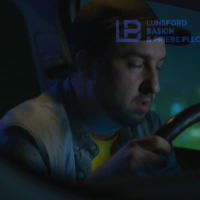Drowsy Driving in Mississippi is Dangerous: How to Avoid It

Mark it on your calendar: November 7-14, 2021, Driving Drowsy Prevention Week. Why does such a week exist? It’s to combat a lesser-known, though equally impactful, cause of car crashes: driving under the influence of fatigue. Over 6,400 fatal car accidents, each year are the result of drowsy driving. Such tragedies can be prevented if people simply understood that driving drowsy is akin to driving drunk.
According to the CDC, driving drowsy causes a “cognitive impairment” level equal to intoxication, mirroring a blood-alcohol level of 0.10% if a person were to be awake for 24 hours. That is higher than the national legal limit of 0.08%. Clearly, the impact of drowsy driving is great and the danger even greater.
At Lunsford, Baskin, & Priebe, we understand these hazards and are expertly equipped to help if you or a loved one has been in a car accident caused by drowsy driving. Read on to learn more about the reasons, signs, and intervention methods for driving drowsy and the path to compensation. Justice is right around the corner.
Reasons for Drowsy Driving
The first step to prevention is understanding why drowsy driving is even a problem. And it is a problem. In 2019, 1,240 drowsy drivers were involved in car crashes. That’s about 2.5% of all car crashes!
Here are the most common reasons for drowsy driving:
- Sleep Deprivation: Without restorative rest, the body will experience issues with balance and coordination and trouble with thinking and coordination.
- Sleep Disorders: Sleep afflictions like insomnia, narcolepsy, and sleep apnea leave a person feeling exhausted the next day.
- Alcohol: Alcohol can make drivers feel sluggish and sleepy, resulting in mental clarity and reaction time issues.
- Medications: From allergy medications to antidepressants, blood pressure medications to muscle relaxants, the number of medications that cause drowsiness are many. Make sure you do not take such medications while operating a vehicle.
- Time of Day: If you are driving between midnight and 6 a.m., be wary of the effects of melatonin, which our bodies naturally produce during this time to make us feel tired and ready for sleep.
Also, if you are driving alone (especially on rural roads), driving long distances, or driving to work at night, use caution on the road. These are additional factors that contribute to drowsy driving and increase the chance of a serious car accident. However, if you are aware of what drowsy driving looks like, you can avoid such accidents.
Signs of Drowsy Driving
Should drivers find themselves in any of the above scenarios, they must take stock of their bodies and their driving. Recognizing signs of drowsiness and pulling over immediately can save lives.
Here are the most common signs of drowsy driving:
- Consistent bouts of yawning
- Periodic closing of eyes or blurry vision
- Repeated head drooping, “nodding off”
- Forgetting where you are or how you got there
- Floating into other lanes
- Driving over or under the speed limit
- Continually missing signs and/or exits
- Veering off the side of the road and hitting an alert/rumble strip
- Feeling agitated, moody, or aggressive while driving
Studies and statistics show that drivers often ignore such signs, the result of which can be deadly. Fortunately, intervention methods exist that help combat these signs and the fatal crashes that they can cause.
Intervention Methods for Drowsy Driving
According to the National Highway Traffic Safety Administration (NHTSA), you can avoid drowsy driving by following some simple guidelines:
- Get the recommended amount of sleep per day. The Mayo Clinic recommends that teenagers get at least 8 hours of sleep a day and that adults get at least 7 hours of sleep a day.
- If you know you are going on a long trip, prioritize sleep especially for that occasion.
- Avoid drinking alcohol, even the night before you intend to drive. Alcohol impacts your body’s ability to get quality sleep, leaving you feeling unrested while driving.
- Double-check the labels on your medication to make sure drowsiness is not listed as a side effect. Use public transportation if the medication does cause drowsiness.
- Refrain from driving between midnight and 6 a.m., but if you must drive during those hours, be on the lookout for signs of drowsiness, especially if you are alone in the car.
- For quick, short-term interventions, drink a cup of coffee or energy drink and/or pull over for a 20-minute nap. While these will help you feel more alert, it’s short-lived, so do not solely rely on these methods to counteract drowsiness.
Drivers who do not follow these recommendations put themselves and others at risk while driving. If you have experienced firsthand the ramifications of drowsy driving, you are not alone. Lunsford, Baskin, & Priebe are here to fight for you.
Lunsford, Baskin, & Priebe: Ready for a Fight
At Lunsford, Baskin, & Priebe, we understand Mississippi comparative negligence laws and can help you collect damages, even if you were partially at fault for the accident. Don’t let another day go by cloaked in uncertainty. Let us unveil how to get money for your medical bills and lost wages. Contact us today for a free consultation. Don’t nod off on your rightful compensation.
